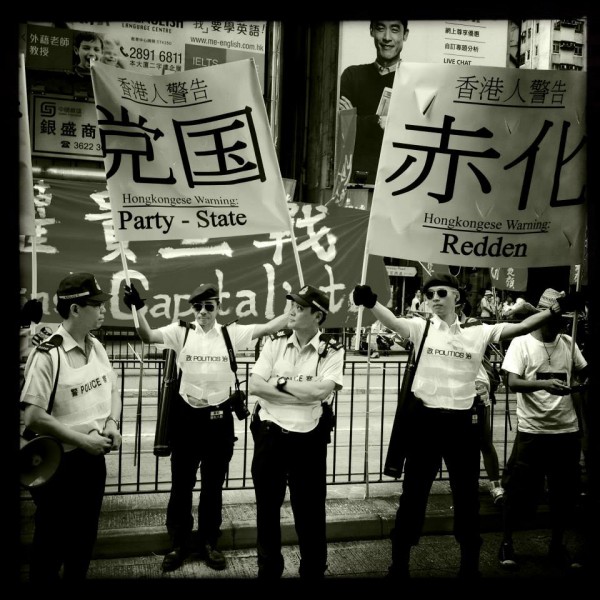
A police officer looks at the warning banners and doesn’t “seem to understand what they mean,” says Kacey Wong, the artist behind the protest artwork. Photo by Kitwa Ho with permission to use.
Hong Kong's police used to enjoy a high approval rating among the city's residents because of the low crime rate. Yet over the past year and a half, that approval has fallen from 71 percent to 54.5 percent, a drop due in part to the perception that the police have become a political tool for the Hong Kong and Chinese governments to repress peaceful protests and interfere with media coverage at the scene.
Local artist and assistant professor at Hong Kong Polytechnic University's design school Kacey Wong wanted to call out the abuse of power, so he created the “Hongkongese Warning Squad,” a unique protest performance that appeared at the city's pro-democracy rally on July 1.
The “Warning Squad” consisted of several people dressed as police officers holding signs inspired by warning banners used by Hong Kong's police when dealing with protests. The signs included “Love the Party” referring to the Chinese Communist Party; “Fake Commie”; “Party-State” referring to the One-Party regime of China; “Reddening” referring to communist encroachment; “Land Grabbing” referring to the land acquisition for the Northeast New Territories development project and “Corruption”.
Below is a video record of the protest:
Many in Hong Kong, a former British colony, fear China's increasing influence over the city. At the July 1 rally, protesters demanded authentic democratic elections in 2017 for the city's next leader. Beijing has promised a direct vote, but has stopped short of allowing Hong Kongers to choose the candidates.
If the city's government fails to come up with a reform free of pre-approved candidates, the group Occupy Central plans to peacefully take over Hong Kong's downtown later this year. During a sit-in after the July 1 rally that the group called a rehearsal for the occupation, more than 500 people were arrested.
Wong explained the reasoning behind the “Warning Squad” in an interview with Global Voices. There is a “worrying trend of selective enforcement” by police, he said. They go after pro-democracy protesters for “arbitrary reasons,” such as a driver of a demonstration van who was arrested along with four passengers at the July 1 rally. Police said he violated an ordinance against idling vehicle engines.
But pro-Beijing protesters aren't given the same harsh treatment, even when they are violent, Wong said. In many cases when pro-Beijing protesters assaulted pro-democracy protesters, they were given minor assault charges and a fine of a few thousand Hong Kong dollars. For pro-democracy protesters, they were charged with police assault, criminal damage, and illegal gathering, which can mean a few months of jail time.
These measures against peaceful protesters are the result of the police wanting to please the governments of Hong Kong and Beijing, he said. “They are the ones who are controlling frontline police officers”:
Such top-down pressures of selective enforcement will not only affect the morale of junior officers but also lead to the eventual collapse of the system. Recent cases show that the city’s anti-corruption agency and police complaint council are no longer functioning to keep powers in check. In short, the kind of power abuse and authoritarian repression we see in the Mainland is actually not far from our very own reality.
Photos of the “Warning Squad” went viral on social media soon after the rally. “This is protest as art and performance. It's about the most subversive and provocative I've seen in Hong Kong,” one commenter, Maureen Nienaber, wrote on Facebook.
Wong believed that people's reactions to the performance reflected the increased tensions between people and the police: “Power corrupts, and absolute power absolutely corrupts. If the government doesn’t handle the delicate situation properly, the system could face total collapse.”
Despite the crackdown, many are determined to fight for full democracy that Hong Kong people have been promised and patiently waited for years. As Wong says:
What is the point of groaning and moaning without doing anything? Why not combine art and politics and take it to the streets: for righteousness, justice, and freedom. Sometimes it is not because you see the possibility of change that you decide to be persistent, but it is because of your persistence, there is change.
Follow our in-depth coverage: Hong Kong's Umbrella Revolution







1 comment